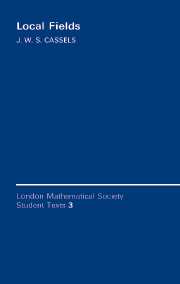Book contents
- Frontmatter
- Preface
- Contents
- Leitfaden
- Notational conventions
- Chapter 1 Introduction
- Chapter 2 General properties
- Chapter 3 Archimedean valuations
- Chapter 4 Non archimedean valuations. Simple properties
- Chapter 5 Embedding theorem
- Chapter 6 Transcendental extensions. Factorization
- Chapter 7 Algebraic extensions (complete fields)
- Chapter 8 p-adic fields
- Chapter 9 Algebraic extensions (incomplete fields)
- Chapter 10 Algebraic number fields
- Chapter 11 Diophantine equations
- Chapter 12 Advanced analysis
- Chapter 13 A theorem of Borel and Dwork
- Appendix A Resultants and discriminants
- Appendix B Norms, traces and characteristic polynomials
- Appendix C Minkowski's convex body theorem
- Appendix D Solution of equations in finite fields
- Appendix E Zeta and L-functions at negative integers
- Appendix F Calculation of exponentials
- References
- Index
Chapter 12 - Advanced analysis
Published online by Cambridge University Press: 05 June 2012
- Frontmatter
- Preface
- Contents
- Leitfaden
- Notational conventions
- Chapter 1 Introduction
- Chapter 2 General properties
- Chapter 3 Archimedean valuations
- Chapter 4 Non archimedean valuations. Simple properties
- Chapter 5 Embedding theorem
- Chapter 6 Transcendental extensions. Factorization
- Chapter 7 Algebraic extensions (complete fields)
- Chapter 8 p-adic fields
- Chapter 9 Algebraic extensions (incomplete fields)
- Chapter 10 Algebraic number fields
- Chapter 11 Diophantine equations
- Chapter 12 Advanced analysis
- Chapter 13 A theorem of Borel and Dwork
- Appendix A Resultants and discriminants
- Appendix B Norms, traces and characteristic polynomials
- Appendix C Minkowski's convex body theorem
- Appendix D Solution of equations in finite fields
- Appendix E Zeta and L-functions at negative integers
- Appendix F Calculation of exponentials
- References
- Index
Summary
INTRODUCTION
There has developed in recent years a p-adic analysis comparable in scope to the classical analysis of real and complex functions, but with many salient differences. A particular object of study has been the so-called p-adic L-functions, which appear to hold the key to several deep unsolved problems. In this chapter we shall develop the theory sufficiently far to explain the slightly sophisticated relationship between p-adic L-functions and the classical L-functions of analytic number theory and to prove one or two nontrivial theorems. Incidentally, this will put the proof of the von Staudt-Clausen relations of Chapter 1, §3 into a natural setting. The final section, which is somewhat divorced from the rest, explains a theorem of Mahler about a development of continuous functions on ℤp as infinite series. Necessarily, this chapter is rather a pot pourri.
The natural domain to work is the field Ωp ⊃ Qp introduced in Chapter 8, §3. All we shall need here, however, is that Ωp is both complete and algebraically closed.
ELEMENTARY FUNCTIONS
If a function of a complex variable is defined by a power series with coefficients in Q then it is natural to use the same power series to define a function of a variable in Ωp (or, rather, in the domain of convergence). One might expect the new function to have properties analogous to the old, and in some cases this is an immediate consequence of the “permanence of algebraic form” (an old Victorian mathematical tool which fell into disrepute because it was mishandled, but which remains a most potent weapon in the mathematician's arsenal).
Information
- Type
- Chapter
- Information
- Local Fields , pp. 280 - 312Publisher: Cambridge University PressPrint publication year: 1986
